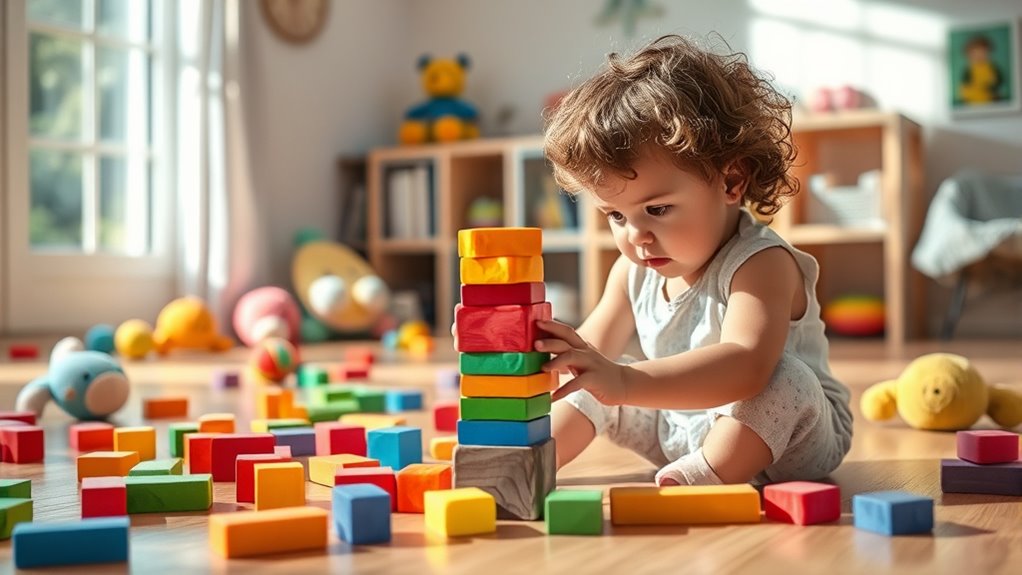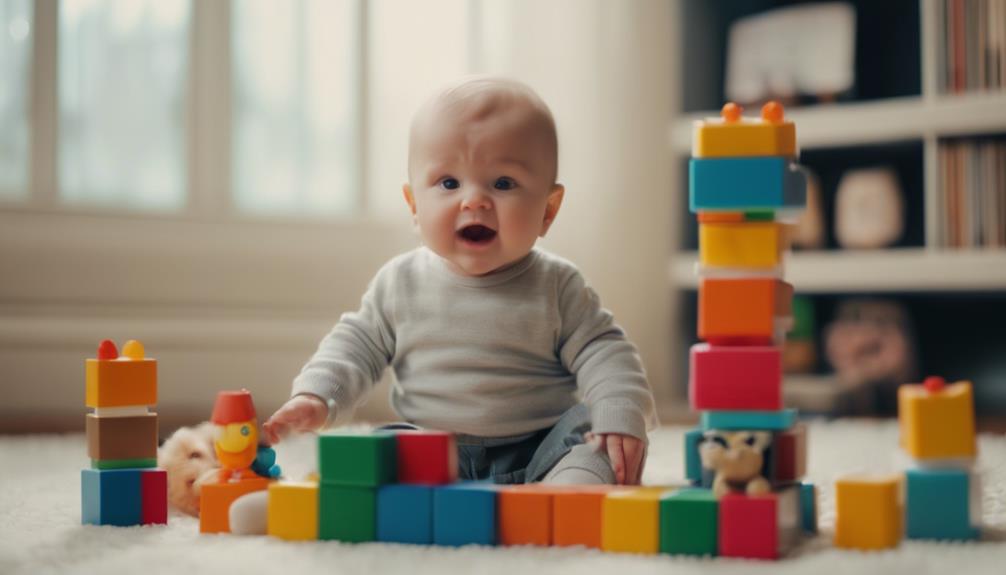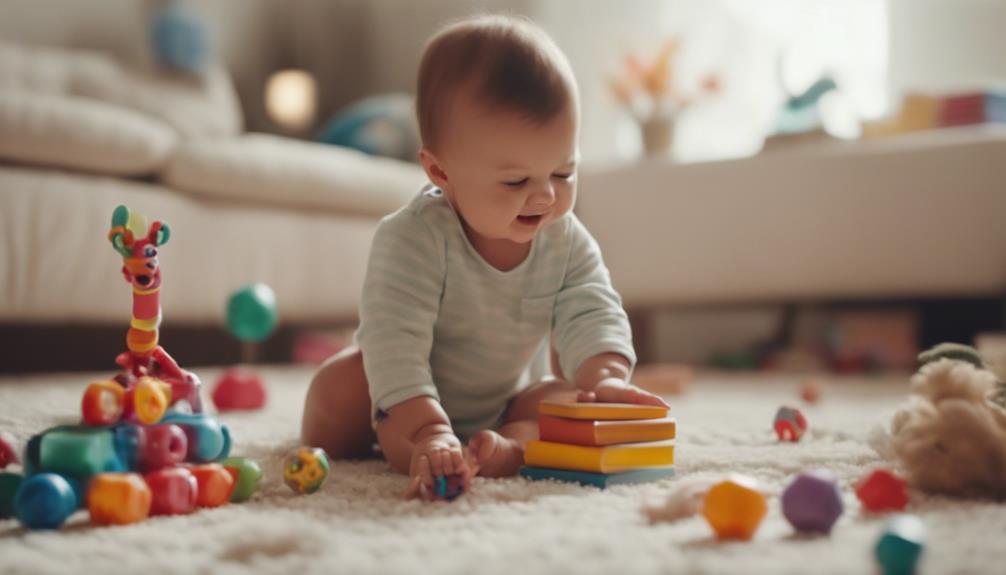To help your toddler develop patience and persistence, try simple games like puzzles and activities that require focused attention. Use timers to introduce a sense of time and encourage them to complete tasks before the clock runs out. Incorporate short breaks with deep breathing or mindfulness to reset their focus. Celebrate small wins to boost their confidence and reinforce steady effort. Keep practicing these strategies consistently, and you’ll discover more ways to nurture their growing self-control and focus over time.
Key Takeaways
- Use simple, engaging games like puzzles and matching to develop problem-solving and focus skills gradually.
- Incorporate timers and visual cues to teach time management and patience during activities.
- Include short, frequent breaks with mindfulness or deep breathing to reset attention and promote emotional regulation.
- Celebrate small successes consistently to boost confidence and reinforce the effort needed to build focus.
- Model calm, focused behavior and guide children gently, emphasizing progress over perfection to foster persistence.

Patience and persistence are essential qualities that help you overcome obstacles and achieve your goals. When teaching your toddler how to focus, these qualities become even more important. Children are naturally curious, but their attention spans are still developing. By engaging them in games that promote focus, you’re helping them build skills that will serve them well throughout life. One effective way to do this is through activities that incorporate time management and emotional regulation. These skills teach your child how to handle frustration, stay attentive, and manage their impulses.
Start with simple games that encourage your toddler to concentrate for short periods. Puzzles are excellent because they require problem-solving and perseverance. As your child works to fit pieces together, they learn to manage their frustration if pieces don’t fit immediately, reinforcing emotional regulation. Additionally, you can set timers for activities, gradually increasing the time as your toddler becomes more comfortable. This introduces the concept of time management, helping them understand that focusing requires effort and that there’s a deadline for completing tasks. Using visual timers can make this process tangible, allowing your child to see the passing of time, which fosters patience and helps them anticipate the next step.
Use simple puzzles and timers to teach your toddler about focus, patience, and time management.
Another game that promotes focus and emotional regulation involves storytelling. Sit with your toddler and create stories together, taking turns adding details. This activity encourages them to listen carefully and stay engaged, which improves their attention span. If your child gets distracted, gently bring their focus back to the story without frustration. This teaches emotional regulation by modeling calm responses to distractions. Over time, your child learns that it’s okay to get distracted sometimes, but patience allows them to gently redirect their focus. Recognizing the importance of building resilience in learning new skills helps reinforce their ability to persevere through challenges.
Incorporating regular breaks into these activities is vital. Short, frequent breaks help your toddler reset their attention and manage feelings of impatience or frustration. During these breaks, you can practice deep breathing or simple mindfulness exercises, reinforcing emotional regulation. As your child becomes more adept at returning their focus after breaks, you’re helping them develop persistence—the ability to stick with a task despite challenges.
Consistency is key. Repeating these games regularly shows your child that focus is a skill they can improve over time. Celebrate small successes to boost their confidence and reinforce positive emotional responses. Remember, teaching patience and persistence through play isn’t about perfection; it’s about guiding your child gently, encouraging steady progress. With time, your efforts will help your toddler develop the self-control and focus needed to succeed in more complex tasks later on.
Frequently Asked Questions
How Early Can Toddlers Start Learning Patience Through Games?
You can start teaching your toddler patience through simple games as early as 18 months, even with their short attention span. Engaging activities like turn-taking and waiting their turn can help reduce temper tantrums caused by frustration. Keep games short and fun, gradually increasing duration. This early practice builds their focus and patience, making future learning smoother and helping them manage emotions better.
Are There Specific Games Suitable for Different Toddler Age Groups?
You’ll find that age-appropriate toys and sensory activities work best for different toddler age groups. For younger toddlers, simple stacking blocks or textured toys help develop focus, while older toddlers benefit from puzzles or matching games. Always choose activities suited to their developmental stage, making sure they’re engaging yet not overwhelming. These tailored games keep your child interested, fostering patience and concentration as they grow.
How Can Parents Encourage Persistence Without Causing Frustration?
Imagine guiding your toddler gently through challenges, like tending a fragile bloom. You can encourage persistence by using reward systems that celebrate effort, not just success. This helps them develop emotional regulation, understanding setbacks are part of growth. Offer praise and small rewards to motivate without pressure, creating a safe space for your child to build resilience. Patience and encouragement nurture their ability to focus and persevere naturally.
What Signs Indicate a Toddler Is Developing Better Focus?
You’ll notice your toddler’s attention span gradually lengthening as they engage more with activities. They may start to concentrate longer on puzzles or books, showing improved concentration skills. Signs include fewer distractions, quicker shiftings between tasks, and sustained interest in play. When your child begins to hold focus longer, it’s a clear indicator that their developing ability to concentrate is strengthening, helping them learn and explore more effectively.
How Do Games for Patience and Persistence Differ From Other Developmental Activities?
You might wonder how patience and persistence games differ from other activities. These games specifically target your toddler’s attention span and emotional regulation, encouraging them to stay focused and manage frustration. Unlike quick, passive activities, they require sustained effort, helping your child build resilience. This active engagement fosters longer attention spans and emotional control, making learning more effective and fun as your toddler develops essential self-regulation skills.
Conclusion
So, there you have it—master the art of patience and persistence, and you’ll have a toddler who can sit still for more than five seconds. Just remember, the real goal isn’t instant focus; it’s turning those tiny tantrums into tiny triumphs. Who knew that a game or two could turn your little whirlwind into a miniature zen master? Good luck, and may your patience be as endless as their energy—because you’re definitely going to need it!










